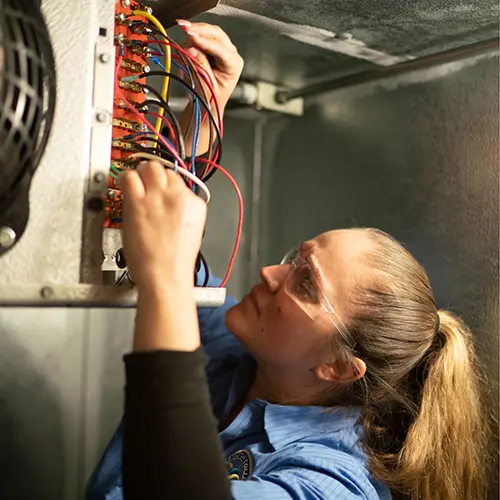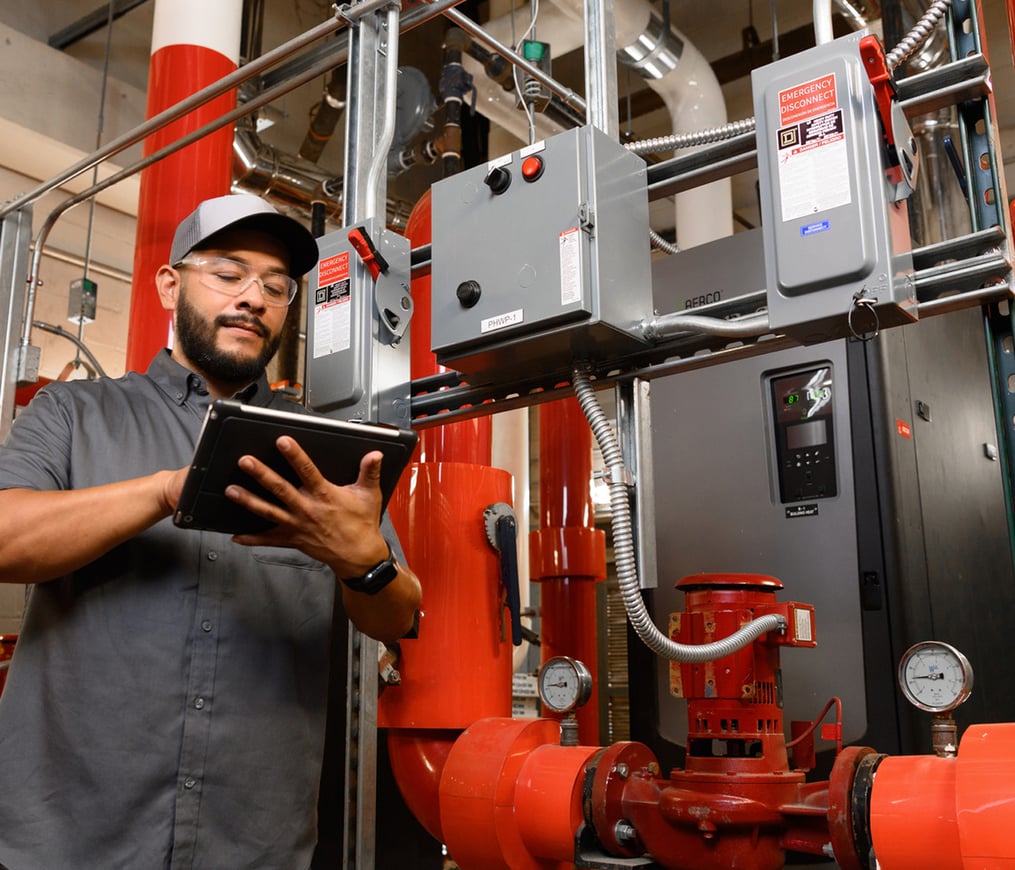Commercial HVAC Installation Solutions for Large-Scale Air Conditioning Solutions
Commercial HVAC Installation Solutions for Large-Scale Air Conditioning Solutions
Blog Article
A Thorough Consider Heating And Cooling Services and Their Influence On Power Effectiveness and Cost Financial Savings
With technical developments like clever thermostats and high-efficiency parts, the potential for optimizing system performance is huge. As we discover the complex relationship between HVAC systems and functional prices, consisting of the shift towards environmentally pleasant options, the question arises: just how can these methods be efficiently executed to make best use of both environmental and economic advantages?

Importance of Heating And Cooling Solutions
cooling and heating systems are a vital component of modern-day structures, playing a crucial role in maintaining healthy and balanced and comfy indoor environments. These systems, encompassing home heating, air flow, and air conditioning, are important for managing temperature level, humidity, and air quality, thereby ensuring the health of residents. Efficient HVAC systems add dramatically to producing an optimal interior climate, which is critical for both property and commercial rooms.
In business structures, a/c systems are indispensable to giving a secure and effective atmosphere. By managing indoor environment conditions, these systems help protect against the development of mold and the spread of airborne impurities, therefore protecting the health of workers and customers. Additionally, in residential setups, cooling and heating systems boost living conditions by offering constant thermal convenience and boosting indoor air high quality, which is important for general wellness.
Moreover, the layout and maintenance of a/c systems have a direct influence on power consumption and operational prices. Correctly created and kept systems can considerably minimize power use, leading to lowered utility expenses and a smaller carbon impact. The effectiveness of these systems hence plays an important role in promoting sustainability and energy conservation within buildings, highlighting their significance in the contemporary architectural landscape.
Developments in HVAC Innovation
Development in a/c modern technology is changing the means structures take care of interior environments, introducing a new period of performance and control. Recent improvements have actually concentrated on maximizing power usage while improving individual comfort. One notable development is the integration of smart thermostats, which utilize fabricated knowledge to find out occupancy patterns and adjust temperature levels appropriately, minimizing unnecessary power use.
Variable Cooling Agent Circulation (VRF) systems represent another substantial jump ahead. These systems enable accurate temperature control in various zones of a structure, improving convenience and lowering power waste. VRF modern technology is especially helpful for big industrial spaces, supplying flexibility and scalability.
Additionally, the advent of Web of Things (IoT) gadgets has actually changed a/c systems into interconnected networks with the ability of real-time information collection and evaluation. This connectivity allows anticipating maintenance, ensuring systems operate at peak performance and lessening unanticipated downtime.
Furthermore, advancements in products and layout, such as the use of high-efficiency coils and compressors, have boosted overall system efficiency - Heating Contractor. The fostering of ecologically pleasant cooling agents also emphasizes the market's commitment to sustainability
These technical innovations are pivotal in minimizing functional prices and ecological influence, setting brand-new standards for constructing climate administration.
HVAC Maintenance and Efficiency
Making sure optimum efficiency of cooling and heating systems prolongs beyond technical developments; it additionally hinges on effective maintenance techniques. Regular maintenance is vital for maintaining efficiency, lowering power intake, and expanding the life expectancy of heating and cooling systems. The key goal is to make sure that all elements function at their peak capacity, thus decreasing power wastefulness and maintaining regular interior convenience degrees.
Regular upkeep jobs, such as cleaning or changing air filters, examining cooling agent levels, and checking ductwork for leaks, are crucial for avoiding unnecessary stress on the system. Filthy or blocked filters can obstruct air movement, creating the system to function tougher and eat more power. Also, insufficient refrigerant levels can minimize cooling down performance, leading to higher operational costs.
Additionally, routine assessments by certified experts can identify possible concerns prior to they intensify into pricey repair services or system failings. These assessments commonly include inspecting electric connections, calibrating thermostats, and guaranteeing the total stability of the heating and cooling system. By dealing with minor issues early, property owners and businesses can prevent unexpected breakdowns and improve energy efficiency.
Cost-efficient A/c Solutions
For those wanting to obtain the most out of their home heating, ventilation, and air conditioning systems without damaging the financial institution, exploring economical HVAC options can make a significant distinction. One immediate action is to invest in programmable thermostats, which allow customers to establish particular temperature levels for different times of the day, enhancing power usage and minimizing unneeded consumption. By automating temperature adjustments, property owners can accomplish significant savings on power bills.
Routine upkeep is one more vital component of economical a/c administration. Making sure that filters are cleansed or replaced frequently, ductwork is sealed, and devices are serviced by specialists can prevent costly repairs and boost system long life. Preventative maintenance not only preserves system effectiveness but additionally aids in preventing unexpected break downs that can cause expensive emergency fixings.
Additionally, retrofitting existing systems with energy-efficient elements, such as variable rate electric motors or high-efficiency compressors, can be a sensible investment. These upgrades boost functional performance, decrease energy usage, and can often be executed at a portion of the cost of a full system replacement.
Ecological Impact Decrease
Minimizing the ecological influence of HVAC systems is critical in today's pursuit of sustainable living. Heating and cooling systems are considerable contributors to power consumption, representing almost 40% of power use in industrial structures. This power need frequently relies upon nonrenewable fuel sources, bring about greenhouse gas exhausts and ecological deterioration. Transitioning to more reliable systems, such as those using eco-friendly power sources, can considerably reduce these impacts.
Technical innovations in heating and cooling style and operation, consisting of the integration of clever thermostats and energy-efficient warmth pumps, are pivotal in decreasing carbon impacts. These innovations permit optimized power use, decreasing wastage and improving overall system efficiency. In addition, embracing routine maintenance methods guarantees a/c systems run at peak performance, additional click for more info reducing unneeded energy intake.
In addition, using ecologically pleasant cooling agents is crucial, as standard cooling site agents, like CFCs and HCFCs, have been eliminated as a result of their ozone-depleting residential properties. Modern options, such as hydrofluoroolefins (HFOs), offer minimized environmental dangers, lining up with global ecological methods. By welcoming these lasting methods, HVAC solutions can play a transformative role in minimizing ecological influences, advertising power efficiency, and promoting a more lasting future.
Verdict

In addition, the design and upkeep of HVAC systems have a direct impact on energy consumption and operational prices. Regular maintenance is crucial for maintaining performance, reducing energy usage, and extending the life span of A/c systems. A/c systems are significant contributors to energy consumption, accounting for almost 40% of power usage in business structures. In addition, embracing routine maintenance practices makes sure heating and air near me Cooling and heating systems run at peak performance, more stopping unnecessary energy consumption.
The change to eco friendly Heating and cooling systems even more promotes and reduces operational costs sustainability. (Heating Contractor)
Report this page